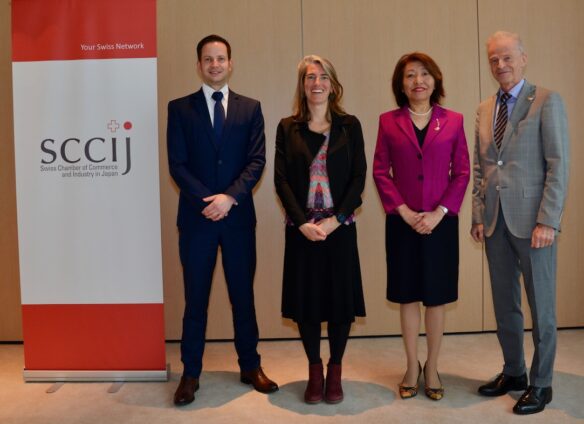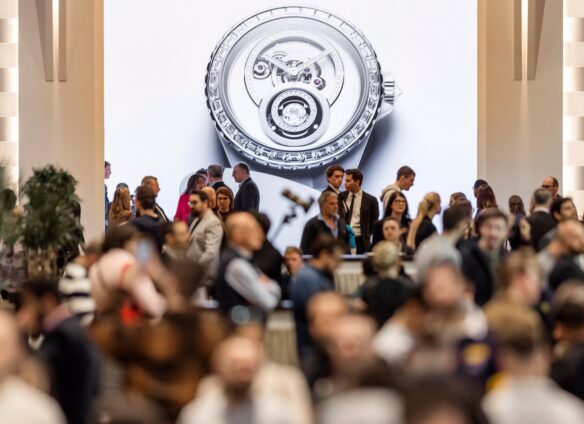Tokyo (SCCIJ) – At the SCCIJ October Luncheon, attended by 50 members and guests of the SCCIJ, Professor Andreas Furrer from Switzerland placed the development of the blockchain technology into the context of Switzerland and explained its legal implications. Also, he gave insights into the evolvement of the so-called Crypto Valley around Zug in Switzerland after the legal environment for companies dealing with cryptocurrencies was altered earlier this year. Initially, the openness of the cantonal and Swiss authorities towards the blockchain technology was a key location factor for the Crypto Valley.
Mystery of smart contracts
After a brief explanation of the distributed ledger technology (DLT), commonly known as blockchain, Professor Furrer expounded the legal challenges of exclusively digital transactions. “Who actually is the owner of a bitcoin, in legal terms, we are not sure even today: In practice, it’s the one who controls the wallet,” he said and caused raised eyebrows in the audience. The legal validity of a transaction on DLT needs first to be clarified based on the functionality of the token. A token is the information stored on the DLT and represents a kind of digital property.
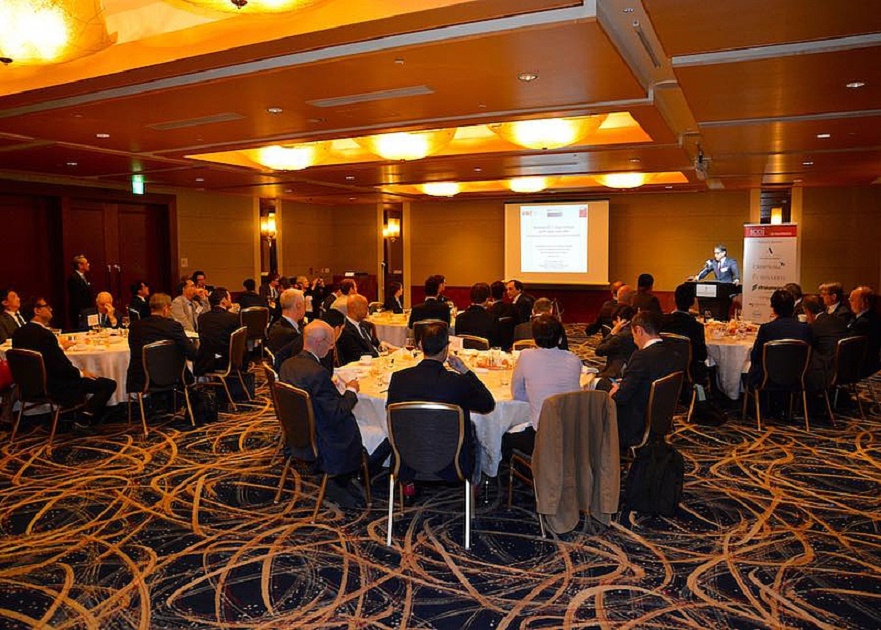
SCCIJ October Luncheon
One important feature of DLT systems is the implementation of “smart contracts”. “These are small programs stored on the DLT which automatically execute transactions,” Furrer stated. This enables legal transactions such as the transfer of rights and assets by changes of information in the transaction protocol. Despite the misleading name, they are no full contracts but rather tools for an automatic execution of a contract. Smart contracts are based on an unalterable code and pre-defined sources of information. Hence, smart contracts could trigger actions and change the content of the tokens involved, he said. Again, the legal validity of these transactions must carefully be analyzed, since all legal prerequisites for each transaction must be fulfilled.
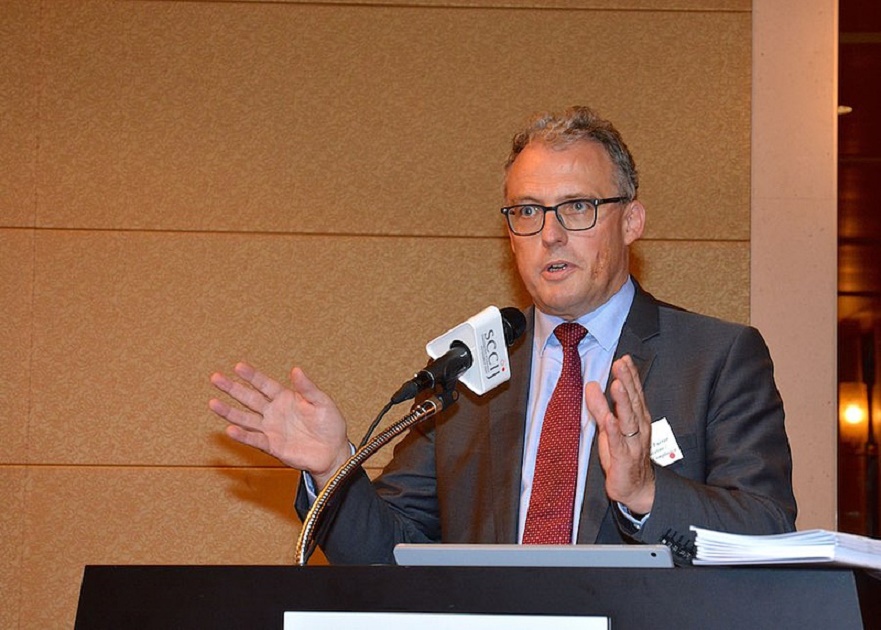
SCCIJ October Luncheon speaker Professor Andreas Furrer
Decentralized recording
The new technology aims to overcome the complexity of business transactions. In complex business chains such as logistic contracts, there are a lot of players involved which leads to complicated contractual situations. Each participant keeps a set of documents and tries to avoid any duty to share them with others. However, each participant is uncertain whether the documents or information are still valid and up-to date and in case of conflicts, such a complete and up-to-date documentation is crucial.
In a blockchain, all this information can be decentralized, stored and managed according to the terms and conditions the parties agreed upon. The smart contract program manages and controls these entries in the protocols. The smart contract further fosters the execution of the contract: “The parties can agree that a fine is automatically paid, if something goes wrong,” the Swiss expert stated.
Thus, this technology will facilitate many transactions and make them more transparent, because the blockchain stores all details and steps in the DLT protocol. Because of this increasing transparency, lawyers can assess a dispute much more easily because one would know much more about the transactions. “This also affects litigation,” Furrer argued. For example, it would become much cheaper to litigate because one could much better assess the own position. In best cases, such litigation can even be avoided since most litigations are disputes on facts, not law.
Crypto success in Switzerland
The speaker turned to the evolvement of the “Crypto Valley” around the town of Zug. There are about 250 to 300 companies with main focus on blockchain, with the Crypto Valley Association having about 700 members, among them visionary leaders of companies such as Ethereum, Monetas and Bitcoin Suisse. Also, there are two crypto “labs” with start-up atmosphere and affordable office space.
“One reason for the success of the crypto valley is the initially very open administration which gave a lot of positive feedback to companies driving the innovation,” he recounted. Also, the location of the valley is good because the financial industry of Switzerland is concentrated in nearby Zurich. The city recently achieved the second place in the Fintech Hub Ranking 2018 after leading Singapore.
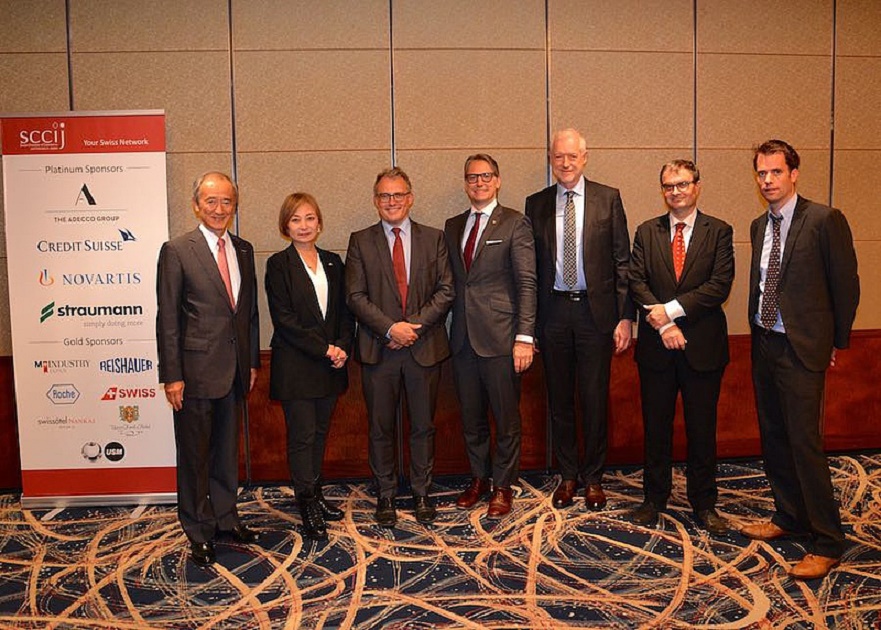
Members and advisors of the SCCIJ Executive Committee with speaker Professor Furrer
“More liberal than Japan”
The valley enjoyed an overwhelming growth between 2013 and 2017. During that time, the Swiss financial supervisor FINMA examined the applications submitted quickly, competently and in a technology-friendly manner, which fostered the environment for blockchain and cryptocurrencies. But in September 2017, FINMA announced a reassessment of its own policy. “Until their decision in February 2018, we could do hardly anything”, Furrer remembered.
At the same time, the banks started raising concerns and even closed accounts of many customers. Finally, FINMA released a guideline on how the financial market regulation has to be applied to crypto projects and raised the standard for measures regarding Anti Money Laundering (AML) and Know Your Customers (KYC). “But the FINMA view is still quite liberal compared to Japan,” the expert said.
Since the establishment of the guidelines, the new crypto infrastructure has further been set up in the valley. “At the same time, competition for Switzerland has increased,” the speaker stated. Countries like Malta, Singapore and Liechtenstein also promote blockchain and distributed ledger technology with verve. The Swiss Banking Association took time until September this year to release its own guideline on how to deal with business customers from the crypto field. Now, many banking relationships could be reestablished, he said.
Foundation as legal entity
Another new idea is the independent control of a DLT protocol. “One legal instrument for this is a foundation,” Furrer explained. The foundation embodies the idea of the protocol and realizes it. The founder’s company will provide technical service for the foundation, but would have no direct access to the assets.
“This is a very safe idea to do this,” the speaker said: “The contributors can be sure that the project is independent from the founders and exclusively dedicated to the goal of the protocol.” If there is a dispute, the foundation’s council is forced to find a solution, as long as it may take. He cited a recent example where the council quarreled for six months before overcoming their differences.
However, today, most projects are embedded into a company established by the founders. This enables a faster and more flexible decision-making process. The founders can keep their direct control of the project; the contributors must therefore have more trust into the founders’ integrity. This form or organization is more appropriate for applications which use basic protocols such a Ethereum, IOATA or Cardano.
Fitting for financial markets
Professor Furrer predicted that the DLT will find its niche in the worldwide trend of digitalization. The financial market industry would be the most important field of application, namely banking services, funds, payment services, and asset handling services. “The advance of this technology might be obstructed by established players, though, because they would fear for their own business,” he said.
His second prediction was that DLT may also be integrated in the Industry 4.0 approach. “But so far, the industrial proof of concept is still missing,” Furrer stated. In the meantime, the technology is being improved: “There are now new protocols with more functionalities and hybrid projects which combine several blockchains.” But this would cause even more challenges from a legal point of view.
Biography of the speaker
Prof. Dr. Andreas Furrer is a full professor at the University of Lucerne (part-time) as well as a partner at MME Legal | Tax | Compliance. As a scientist he teaches and conducts research in the field of contract law and conflict of laws with a focus on transport and logistics law as well as digital technologies (especially DLT systems). As a lawyer in Zurich, he heads the Transport and Logistics Law and Trade Compliance departments and is a partner in the firm’s large crypto department. Since 2015, he has been working intensively on DLT-related legal issues and advises clients within the framework of ICO and, in particular, in the industrial application of DLT systems.
The speaker studied and worked at the universities of Freiburg i.Ü., Saarbrücken, St.Gallen (HSG), at the European University Institute in Florence (EUI), Bremen and Lucerne. As founding professor, he was involved in setting up the Faculty of Law, which is now the third largest German-speaking faculty of law in Switzerland. He worked as a lawyer in a larger law firm in Baden, later in a leading major law firm in Zurich. Since 2007 he has been the partner of MME Legal | Tax | Compliance, which today has around 100 employees in Zurich and Zug.
Text and photos: Martin Fritz for SCCIJ





